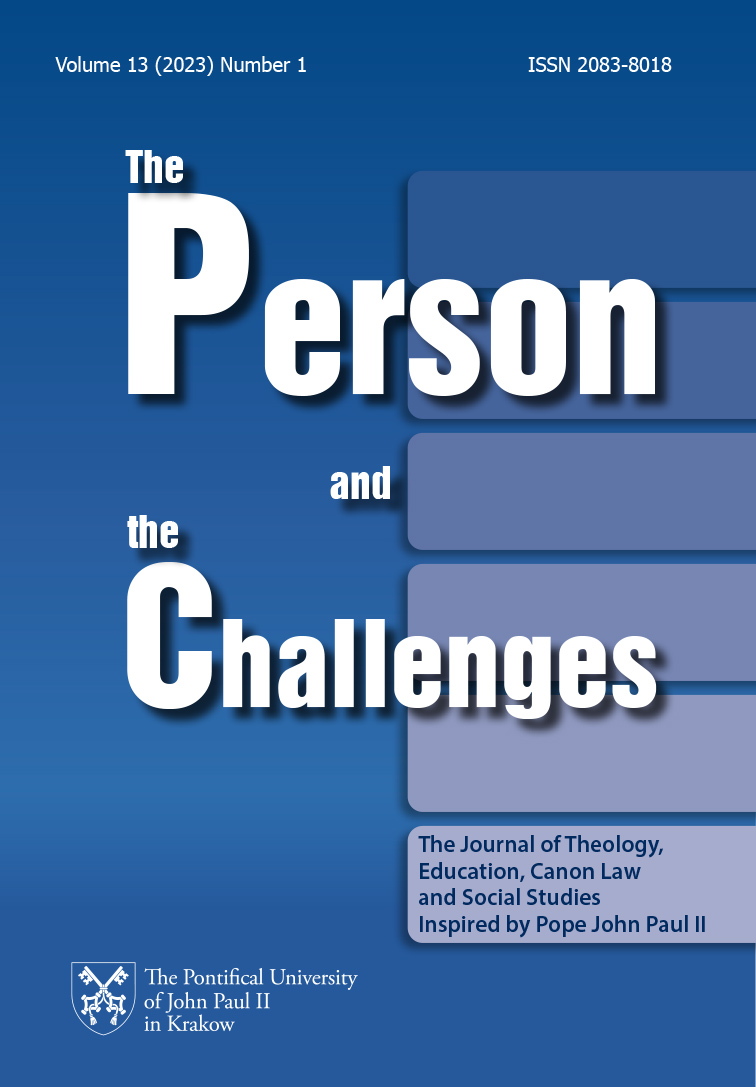Educazione e formazione: l’approccio, le sfide e la risposta audace di Edmund Bojanowski. Education and Training: Edmund Bojanowski’s Approach, Challenges and Bold Response
DOI:
https://doi.org/10.15633/pch.13112Keywords:
Instructors, Edmund Bojanowski, Ochroniarki, training, children’s educationAbstract
Edmund Bojanowski, an esteemed Polish pedagogue who lived in the XIX century, dedicated his life to the creation of education services for small children in his country, (which he called Ochronki (= protection), and to the training of the women instructors (Ochroniarki = the protectors). His objective was a preschool education inspired by Catholic values, as man was created “in the image and likeness of God”; he envisioned a system that would raise good citizens and good Christians, enabling them to tackle the challenges of life. Blessed with a strong educational vocation, he put great effort in preparing the women instructors for this task, providing them with both pedagogic knowledge and rigorous moral principles, as well as promoting critical thinking and sense of responsibility, with the authority borne of love for the true good. He strived to promote these abilities in his instructors, so that they would transfer them to the children; he felt these qualities transform knowledge into life wisdom, and allow a person to live with dignity and respect for oneself and others. These core beliefs were also the basis for the creation of a religious order of nuns.
References
Basso M., Il buon samaritano che nelle strade del mondo dà la mano all’uomo d’oggi, Roma 1995, ed. Congregazione delle Suore Ancelle della Beata Maria Vergine Immacolata.
Bojanowski E., La corrispondenza dal 1829 al 1871. Le spiegazioni, il commento e l’introduzione della monografia sono a cura di Leonard Smołka, Vol. I–IV, Wrocław 2001, ed. Zgromadzenie Sióstr Służebniczek Najświętszej Maryi Panny.
Introduzione e commento a cura di Leonard Smołka, Vol. I–IV, Wrocław 2009, ed. Zgromadzenie Sióstr Służebniczek Najświętszej Maryi Panny.
Bojanowski E., Raccolta degli articoli sull’educazione e la scienza, Vol. I–II, Archivio delle Suore Ancelle di Dębica (s.a.).
Bojanowski E., Regola della Congregazione delle Ancelle della Vergine Maria dell’Immacolata Concezione 1867, Katowice 1991, ed. A servizio dei poveri, Roma 2000, (s.e.).
Brzeziński A., Ricordo di Edmund Bojanowski fondatore della Congregazione delle Ancelle della Madre di Dio Vergine Immacolata, Poznań 1872 (s.e.).
Formella Z., L’educatore maturo nella comunicazione relazionale, Roma 2009, Aracne.
Gigilewicz E. – Opiela M.L. (eds.), Lavori, schemi e appunti di Edmund Bojanowski, Vol. I–II, Lublin 2016, KUL.
Grocholewski Z., L’educazione integrale secondo il Beato E. Bojanowski, in: Opiela L. – A. Smagacz – S. Wilk (eds.), Servire ed educare all’amore. Il Beato Edmund Bojanowski – educatore e apostolo dei laici, Lublin 2009, KUL.
Opiela M. L. – M. Kaputed altri., Il programma dell’educazione prescolare, secondo il concetto pedagogico del Beato Edmund Bojanowski, Dębica 2008, ed. Zgromadzenie Sióstr Służebniczek BDNP.
Opiela L., Sul programma dell’educazione prescolare secondo il concetto pedagogico del Beato Edmund Bojanowski], in: Zgromadzenie Sióstr Służebniczek NMP, Il Beato Edmund Bojanowski. Il suo diario è un messaggio per oggi, Wrocław 2010, ed. Zgromadzenie Sióstr Służebniczek NMP.
Opiela M. L., La realizzazione del pensiero pedagogico del Beato Edmund Bojanowski nell’educazione della prima infanzia come base per l’educazione integrale di una persona, in: M. L. Opiela (ed.), L’eredità del pensiero pedagogico di Edmund Bojanowski nell’educazione contemporanea in Polonia e nel mondo, Lublin 2014, KUL.
Rynio A., Il valore del tempo della formazione integrale secondo Edmund Bojanowski, “Roczniki Pedagogiczne”, Numero Speciale: Il pensiero pedagogico di Edmund Bojanowski e la sua realizzazione oggi, 9 (2017) 45, pp. 83–84.
Smołalski A., Pedeutologia storica, Wrocław 2006.
Soreca S., La formazione di base per i catechisti. Criteri, competenze e cenni di metodologia, Roma 2014, LAS.
Downloads
Published
Issue
Section
License

This work is licensed under a Creative Commons Attribution 4.0 International License.
Authors who publish with this journal agree to the following terms:
- Authors retain the copyright and full publishing rights without restrictions, and grant the journal right of first publication with the work simultaneously licensed under a Creative Commons Attribution 4.0 International License that allows others to share the work with an acknowledgement of the work's authorship and initial publication in this journal.
- Authors are able to enter into separate, additional contractual arrangements for the non-exclusive distribution of the journal's published version of the work (e.g., post it to an institutional repository or publish it in a book), with an acknowledgement of its initial publication in this journal.
- Authors are permitted and encouraged to post their work online (e.g., in institutional repositories or on their website) prior to and during the submission process, as it can lead to productive exchanges, as well as earlier and greater citation of published work (See The Effect of Open Access).

